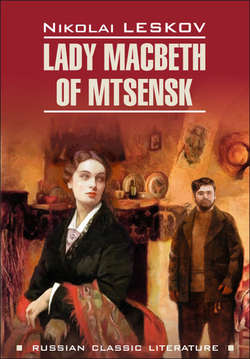Читать книгу Lady Macbeth of Mtsensk and Other Stories / Леди Макбет Мценского уезда и другие повести. Книга для чтения на английском языке - Николай Лесков - Страница 14
Lady Macbeth of Mtsensk
Chapter Thirteen
ОглавлениеThe party in which Sergei and Katerina Lvovna found themselves set out when spring had begun only by the calendar, while, as the popular proverb says, “There was lots of sun, but heat there was none.”
Katerina Lvovna’s child was given to Boris Timofeich’s old sister to be brought up, because, being counted as the legitimate son of the criminal woman’s husband, the infant was now left the sole heir to the entire Izmailov fortune. Katerina Lvovna was very pleased with that and surrendered the baby quite indifferently. Her love for the father, like the love of many all too passionate women, did not extend in the least to the child.
Anyhow, nothing in the world existed for her: neither light, nor darkness, nor good, nor bad, nor boredom, nor joy; she did not understand anything, did not love anyone, did not love herself. She waited impatiently for the party to set out on its way, when she hoped to be able to see her darling Sergei again, and she even forgot to think about the baby.
Katerina Lvovna’s hopes were not deceived: heavily bound in chains, branded, Sergei came out of the prison gates in the same group with her.
Man accustoms himself as far as possible to any abominable situation, and in every situation preserves as far as possible his capacity to pursue his meager joys; but for Katerina Lvovna there is nothing to adjust to: she sees her Sergei again, and with him even the convict’s path blossoms with happiness.
Katerina Lvovna took very few valuable things with her in her canvas sack and even less money. But long before they reached Nizhny she had given it all away to the convoy soldiers in exchange for the possibility of walking beside Sergei or standing for a little hour embracing him on a dark night in a cold corner of the narrow transit prison corridor.
Only Katerina Lvovna’s branded young friend somehow became very reserved towards her: he did not so much talk as snap at her; his secret meetings with her, for which, not thinking of food or drink, she gave the necessary twenty-five kopecks from her lean purse, he did not value very highly; and more than once he even said:
“You’d do better to give me the money you gave the soldier, instead of us rubbing against corners in the corridor.”
“All I gave him was twenty-five kopecks, Seryozhechka,” Katerina Lvovna tried to excuse herself.
“As if twenty-five kopecks isn’t money? Did you pick up a lot of these twenty-five kopecks on the way, that you hand them out so freely?”
“That’s how we could see each other, Seryozha.”
“Well, where’s the joy of seeing each other after such suffering! I could curse my whole life, not just these meetings.”
“And for me it makes no difference, as long as I get to see you.”
“That’s all foolishness,” replied Sergei.
Katerina Lvovna sometimes bit her lips until they bled hearing such replies, and sometimes her eyes, not given to weeping, filled with tears of anger and vexation in the darkness of their nighttime meetings; but she endured it all, kept silent, and wished to deceive herself.
Thus, in these new relations with each other, they reached Nizhny Novgorod. Here their party merged with another party that was going to Siberia from the Moscow highway.
In this big party, among a multitude of people of all sorts in the women’s section, there were two very interesting persons. One was Fiona, a soldier’s wife from Yaroslavl, a splendid, magnificent woman, tall, with a thick black braid and languorous brown eyes, curtained as with a mysterious veil by thick eyelashes; and the other was a sharp-faced seventeen-year-old blonde with tender pink skin, a tiny little mouth, dimples on her fresh cheeks, and golden blonde locks, which stubbornly strayed across her forehead from under her convict’s kerchief. In the party they called this girl Sonetka.
The beautiful Fiona was of a soft and lazy disposition. Everyone in her party knew her, and no one among the men rejoiced especially at achieving success with her, and no one was upset at seeing her grant the same success to another suitor.
“Our Aunt Fiona is a kindly woman, she doesn’t offend anybody,” the convicts all joked unanimously.
But Sonetka was of a completely different sort.
Of her they said:
“An eel: slips through your fingers, and never lingers.”
Sonetka had taste, chose her dishes, and maybe even chose very strictly; she wanted passion to be offered to her, not blandly, but with a piquant, spicy seasoning, with sufferings and sacrifices; while Fiona was Russian simplicity, who is even too lazy to say “Go away,” and who knows only one thing, that she is a woman. Such women are very highly valued in robber bands, convict parties, and the social-democratic communes of Petersburg.
The appearance of these two women in one combined party with Sergei and Katerina Lvovna had tragic consequences for the latter.
